Jun 2017 1st Edition
Jun 2017 1st Edition Estelle Greeff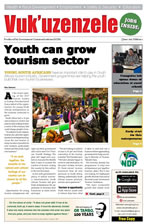
Youth can grow tourism sector
Youth can grow tourism sector Estelle GreeffYoung South Africans have an important role to play in South Africa’s tourism industry. Government programmes are helping the youth build their own tourism businesses.
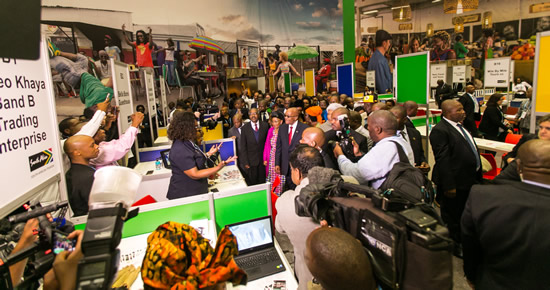 At the recent opening of the 2017 Tourism Indaba in Durban, President Jacob Zuma talked of the opportunities for young South African entrepreneurs as the industry continued to grow.
At the recent opening of the 2017 Tourism Indaba in Durban, President Jacob Zuma talked of the opportunities for young South African entrepreneurs as the industry continued to grow.
South Africa had a 13 per cent increase in visitors last year, he said, making tourism a sector of the economy that could change people’s lives.
“In addition to job creation, tourism also provides opportunities for entrepreneurship. Given the low barriers to entry, it makes it possible for new entrants, particularly women and the youth, to get into business.”
Opportunities for young tourism entrepreneurs will open up when government rolls out its new 5 In 5 Tourism Growth Strategy. The plan will target new markets in Asia and the Middle East. It aims to increase the number of tourists visiting the country by five million in the next five years.
In line with government’s policy of radical economic transformation, South African Tourism will give black entrepreneurs the opportunity to showcase their businesses at trade shows and expos.
“We are looking to achieve at least a 30 per cent black ownership of the tourism industry,” the President said. “We have already begun to invest in transformation. At this year’s Indaba, we have 90 black-owned tourism businesses from all nine provinces in South Africa, offering authentically South African tourism products, services and experiences.”
Tourism is opportunity
South Africa’s youth need to believe they have what it takes to start and run a business before approaching government for help, according to Minister of Tourism Tokozile Xasa.
Her ministry already has programmes to help new entrepreneurs put together business plans. But it was not looking for haphazard growth, Minister Xasa said at the recent Local Government Tourism Conference.
“We want sustainable growth that creates more opportunities for black people, especially people in rural areas, and for women, the youth and people living with disabilities. We want growth in tourism to lead to economic and social transformation for our country.”
She said all South Africans were partners in ensuring tourism became one of the more important and growing sectors of the economy.
“Tourism is a half-exposed treasure chest. The lid is half-opened and not many of our people can get to the jewels. If we all work together, we can prise that lid open, so that the benefits of tourism, and the natural and cultural heritage of our country, can be shared by all the people in our country.”
Supporting enterprises
Government has created multiple programmes to make it easier for previously disadvantaged entrepreneurs to enter the tourism sector and grow existing businesses.
The tourism department recently launched a new Enterprise Development Programme. This provides incubators to small businesses at strategic tourism nodes, a tourism information portal to bridge the information gap between entrepreneurs and business opportunities, as well as business development and market access support to 300 enterprises countrywide.
“The incubator enables enterprises to obtain business support services offered mainly from the location of their businesses,” Minister Xasa said.
Also, in 2014 the Women in Tourism Forum was launched to address the challenges faced by women, in an industry where most women work in low-level jobs. In 2016 the department launched the Executive Development Programme to complement the 2014 programme.
Both initiatives are designed to build black women’s leadership and business skills. The department also gave 20 young women full scholarships to study at Unisa’s School of Business Leadership.
The minister has acknowledged the myth of employment in the tourism industry – “hard labour, overwork and low pay”. To dispel this myth and open the sector for more entrepreneurial black youth, government will focus on creating more opportunities for youth, training them, and encouraging them to find their place in the industry.
Tourism is an opportunity for youth to show their love of South Africa – its natural beauty and diversity, spectacular scenery and warm beaches. A new generation of young entrepreneurs can now promote their country to the world.
Tshepo One Million gives hope to unemployed youth
Tshepo One Million gives hope to unemployed youth Estelle GreeffThe Gauteng government’s Tshepo One Million Programme aims to target a million young people with skills training, job placement and entrepreneurship development.
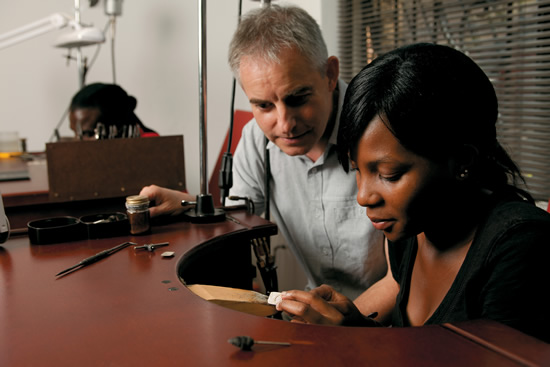 This month the Gauteng government will launch the Tshepo One Million Programme when it signs an agreement with 20 private sector partners.
This month the Gauteng government will launch the Tshepo One Million Programme when it signs an agreement with 20 private sector partners.
Gauteng Premier David Makhura has announced that the province had doubled its target set for 2019. The Tshepo 500 000 programme will now be known as Tshepo One Million.
Premier Makhura was addressing a meeting on youth empowerment partnerships in Sandton, where more than 20 companies had committed to work with the province to give hope to Gauteng’s unemployed young people.
Major international and local companies have committed to work with the provincial government. They include Microsoft SA, Coca-Cola, Hollard, Gijima, Shanduka Black Umbrellas and Cofesa.
In 2014, the provincial government launched the Tshepo initiative with the aim of empowering about 500 000 young people through skills training, job placement and entrepreneurship development. Due to its success, and the enthusiastic support it received from the private sector, its target has now been increased.”
Giving hope to the youth
Premier Makhura encouraged the private sector to work with government to create opportunities for young people and give them hope.
“Youth unemployment is the most acute and primary economic problem of our time. In Gauteng, we currently have about 2.7-million young people of working age, who are not in education and employment.
“Two years after we launched Tshepo 500 000, we reached 354 633 young people. That is when we decided to increase our target to empower one million young people by 2019.
“This is part of radical economic transformation and we can only achieve it through partnerships with the private sector,” he said.
Digital skills
Microsoft SA’s Siya Madyibi said the company would provide one million young people with training opportunities in digital skills. This partnership commits to a mass-scale deployment of the Microsoft Digital Literacy and Virtual Academy Platform.
The training will be run through the Tshepo One Million learning lab network attached to local libraries, based on the Massive Open Online Varsity system piloted by the City of Johannesburg.
“At least one million young residents of Gauteng will be trained in basic proficiency as users of the most current versions of Microsoft Word, Microsoft PowerPoint and Microsoft Excel. This training will increase young jobseekers’ chances of employability,” said Madyibi.
The Gauteng government will work with Shanduka Black Umbrellas and SekelaXabiso Auditors as lead implementing project partners within the evolution and rollout of the Township Marketplace Platform and wider Tshepo One Million programme.
This article was originally published on SAnews.gov.za
Let us all make our voices heard and declare ‘Ro neta!’
Let us all make our voices heard and declare ‘Ro neta!’ Estelle Greeff
Our country has recently been saddened and angered by yet another spate of violence against women in various parts of South Africa.
A number of women were killed by men who tortured and mutilated their victims. In the process they trampled on our Constitution, which acknowledges the inherent dignity of each person, guarantees the right to life and affords all of us freedom of movement and residence.
Sadly, the grave is now the residence of women whose dignity and lives meant nothing to their abusers.
We should all be outraged and seriously concerned about the reports of the abuse and killing of women and children in some parts of the country. We should be extremely concerned that in most cases, these attacks occur at the hands of family members or in the case of women, their intimate partners.
These crimes are rooted in the social fabric of our families and communities. They are therefore difficult to police in conventional ways – short of having a police officer in every home or in every public space where men and women may encounter one another.
It is therefore essential that citizens must, without breaking the law themselves, work with our law-enforcement agencies and all sectors of society to fight this terrible scourge and isolate these criminals in society.
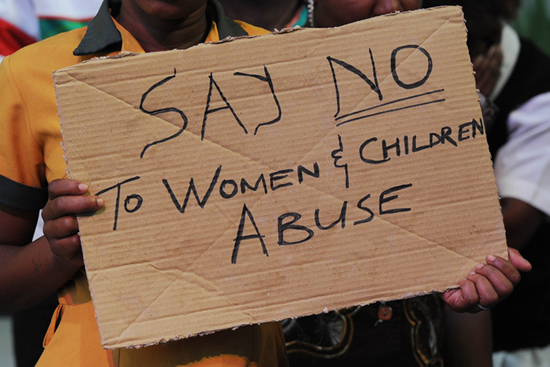 Victims should not turn a blind eye to violence in their intimate relationships, at home, work or school, but should immediately report incidents to authorities before such abuse intensifies and leads to murder.
Victims should not turn a blind eye to violence in their intimate relationships, at home, work or school, but should immediately report incidents to authorities before such abuse intensifies and leads to murder.
The rate of abuse and violence against women and children is completely unacceptable, but the situation is by no means hopeless.
Government has declared violence against women a priority crime. We are seeing positive results as victims or those around them step forward and work with community-based organisations, the police and our courts to bring abusers to book.
We are seeing more and more perpetrators being caught and being given long jail terms, including life.
Access to justice
In support of laws and policies on domestic violence, sexual offences and harassment, government is doing a lot of work to offer victims of abuse and violence safe havens and access to justice.
The Department of Social Development has established eight Khuseleka One Stop Centres which offer a range of support services to victims of crime.
The same department funds 102 shelters for victims of gender-based violence, in addition to 19 White Doors (Safe Houses) to provide safety and shelter services to victims of domestic violence.
The Department of Social Development has also established the Gender-based Violence Command Centre with a toll free number 0800 428 428 and the “please call me” number *120*7867#.
Skilled social workers are on hand at the command centre to provide telephonic counselling services and other interventions.
The system is able to track the physical location of the callers to facilitate speedy interventions and referrals, where necessary.
SAPS has established 1 027 Victim-Friendly Rooms at certain police stations. These are private rooms where victims of gender-based violence are interviewed for statement taking. They provide a friendly environment that assures confidentiality, respect and dignity.
Centres of care
We also have 55 Thuthuzela Care Centres across the country, with a major focus on sexual violence. These centres give medical treatment to victims and survivors of rape, and ensure evidence is collected which can be used at trial.
With these services at the disposal of persons directly or indirectly affected by abuse, victims of violence should feel confident to report perpetrators to the police and other agencies that can help.
The work done by government and many community-based organisations around the country are part of our commitment to 365 Days of Activism for no violence against women and children.
We are fighting abuse and violence round the clock. We will do so as long as women and children continue to suffer.
For our society to succeed in this area, all of us must declare: “Ro neta! (Enough! Not in my name!)” It is not only victims who must make their voices heard, but it must be all of us who speak on their behalf and report and condemn abusers.
Men, in particular, must take a stand against other men who are abusive and violent.
Women account for the majority of our population, yet face the greatest burden of abuse. This cannot be how our society treats our mothers, sisters, aunts, daughters.
We must look deep into our hearts and our values and we must end the violence..
Making eThekwini most caring city in Africa
Making eThekwini most caring city in Africa Estelle GreeffRapid urbanisation poses complex challenges, such as poverty and homelessness. This reality faces most cities in developing countries, including eThekwini Metropolitan Municipality, writes Executive Mayor Zandile Gumede.
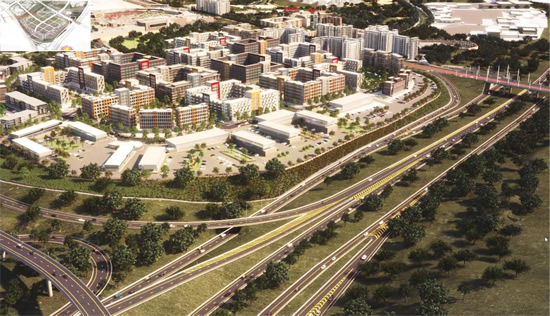 In eThekwini we are focused on improving the economic status of all our people and eradicating poverty, unemployment and inequality.
In eThekwini we are focused on improving the economic status of all our people and eradicating poverty, unemployment and inequality.
Every year millions of people across the world migrate from rural to urban areas in search of a better life. As a city, we must up the pace of service delivery in line with these migration patterns.
Poverty, unemployment and inequality are also found in cities. So people migrating to cities in search of a better quality of life often find themselves facing the same difficulties they had hoped to escape.
A high urban population growth rate can have advantages: a larger domestic market and more global investment. But it also comes with challenges.
EThekwini is South Africa’s third most significant city economy. In a country where almost half the youth population is unemployed, cities must respond to the urgent challenges of skills and economic development.
A framework for transformation
The eThekwini Municipality has initiated a number of programmes to create jobs and, at the same time, stimulate the city’s economy.
The new eThekwini Radical Economic Transformation Framework demonstrates our commitment to accelerating service delivery, providing economic opportunities to poor and unemployed residents, and growing the small business sector.
The framework aims to make eThekwini the most caring and liveable city in Africa by 2030.
Public-private partnerships can make a large contribution, and give business the opportunity to help overcome our socioeconomic challenges.
Through this framework, the municipality will facilitate a number of mega developments. Many exciting projects planned, but I will highlight only a few.
New developments
First, the multimillion-rand Inner City Regeneration Project is underway. This massive investment programme will change the face of the central business district and increase the resident base from some 80 000 to over 450 000.
The R25-billion Cornubia Development, one of the city’s key projects, will establish a sustainable, mixed-use, mixed-income settlement of some 25 000 dwellings. It is expected to create 40 000 permanent jobs. The second phase of the project is underway.
The 1 000-hectare mixed-use Ocean Dune Sibaya, part of the Oceans and Park Square Developments in Umhlanga, will provide 9 000 residential dwellings and half a million square metres of commercial and public amenities.
We are working hard to promote social and economic transformation by ensuring residents are given opportunities to contribute meaningfully to eThekwini’s mainstream economy. We are moving towards making eThekwini the ultimate destination to live, work and play.
Zandile Gumede is the Executive Mayor of eThekwini Metropolitan Municipality.
NYDA funds to grow young students and entrepreneurs
NYDA funds to grow young students and entrepreneurs Estelle GreeffThe National Youth Development Agency’s (NYDA) R430-million budget will allow it to continue funding young entrepreneurs, students and artisanal training programmes, and open four new branches.
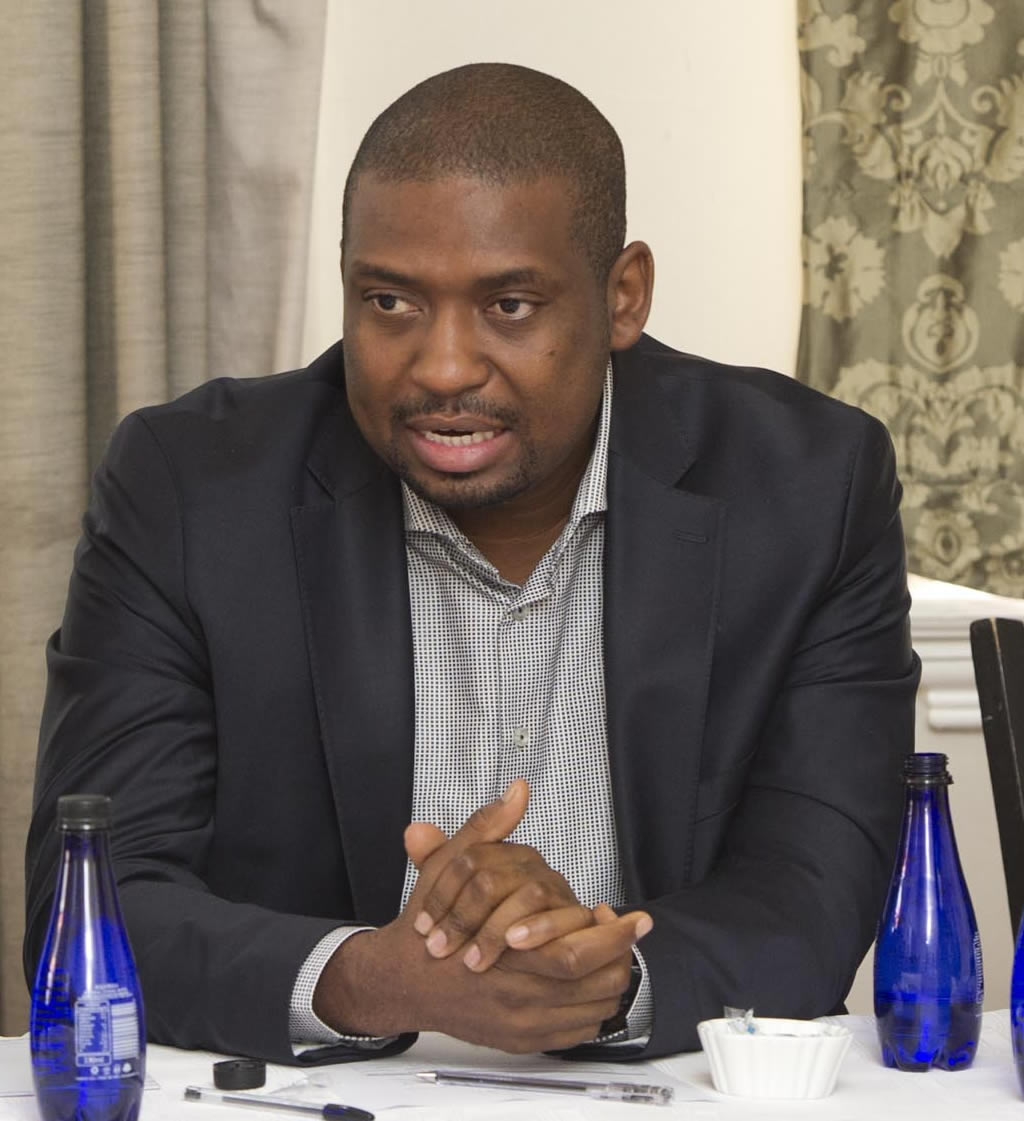 “We are playing and we will continue to play a strong coordinating role in directing youth development, ensuring that youth priorities are adequately met, monitoring services and developing evidence based policies and programmes that advance the youth development agenda,” Deputy Minister in the Presidency for youth development Buti Manamela said.
“We are playing and we will continue to play a strong coordinating role in directing youth development, ensuring that youth priorities are adequately met, monitoring services and developing evidence based policies and programmes that advance the youth development agenda,” Deputy Minister in the Presidency for youth development Buti Manamela said.
Education
A total of R46-million will go to supporting the National Youth Service (NYS), in partnership with the Expanded Public Works Programme. The NYDA will build a database of NYS projects and volunteers. It will fund training for the volunteers, who go on to mentor young people in life skills and entrepreneurship.
“A further R80-million will be invested towards education, jobs and skills development in 2017/18,” the Deputy Minister said.
“This will see 5 000 young people being placed in available job opportunities, 500 students will receive scholarships through the Solomon Mahlangu Scholarship Fund and 60 000 young people will be provided with skills development training.
“The NYDA will continue to fund 400 students from previous years and another 500 will continue to receive training to become artisans.”
New branches
Budget has been set aside for four new regional offices – in Ekurhuleni in Gauteng, the OR Tambo District Municipality in the Eastern Cape, and Richards Bay and Newcastle, both in KwaZulu-Natal.
“All branches will be equipped with free wifi services to provide young people with access to technology.
“The soon-to-be launched NYDA app will become another platform for youth to connect to their agency.”
Entrepreneurship
This year the NYDA will invest some R72-million in economic participation programmes.
The funds will go to both grants and training for young entrepreneurs.
“This will result in over 800 new entrepreneurs being funded through developmental finance, with the creation of more than 3 000 jobs in numerous sectors,” Deputy Minister Manamela said.
In the last financial year the agency granted 700 entrepreneurs with start-up or development funding.
An additional 60 000 aspiring entrepreneurs went through the NYDA’s business development training.
Training included identifying opportunities, writing a business plan and basic accounting..
Hostel improves farm school education
Hostel improves farm school education Estelle GreeffLearners from trust villages near Thaba ’Nchu used to have to travel up to 70 kilometres to get to their farm school. Now a new hostel is changing their lives, and their education.
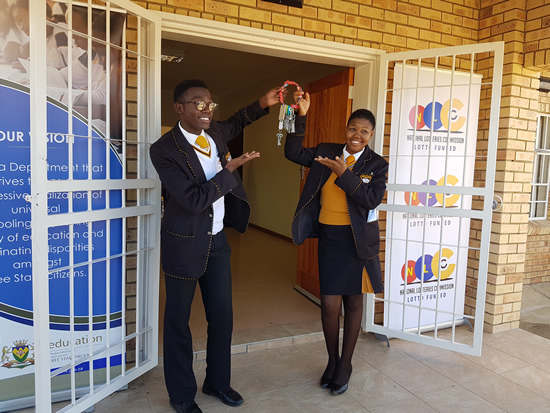 Sediti Secondary School near Thaba ’Nchu, deep in the rural hinterland of the Free State, is difficult to get to.
Sediti Secondary School near Thaba ’Nchu, deep in the rural hinterland of the Free State, is difficult to get to.
A “farm school” serving 23 trust villages, many of its 500 learners had to travel distances of 16 to 70 kilometres to get there.
Now, thanks the Free State Department of Education, Kagiso Trust and the National Lotteries Commission (NLC), their lives have become a bit easier. A hostel for some 300 learners has been built at the school.
The hostel will mainly house Grade 12 learners, with the rest of the rooms going to the learners who live furthest from the school.
The NLC granted R15-million towards building the hostel, and the Free State Department of Education R30-million. The department has already built 36 hostels at farm schools across the province.
Closing the gap
Education MEC Tate Makgoe said the hostel was an educational investment in the rural community.
“No country has ever been successful without education,” he said. “Education is the only weapon to fight unemployment and change our communities.”
He told the learners they should know they could start as a farm school learner and end up being a president, a doctor or an engineer.
Farm schools were a priority, MEC Makgoe said, because their standard of education was historically poor.
“We are closing the gap between the child who goes to school in town and on the farms because we want to make sure that every child has access to good quality education.”
Top matriculants
The school’s principal, Maleshwane Mohapi, said the hostel would boost learning. “These facilities will help our children greatly, and they will improve the learners’ performances.”
The NLC’s Charlotte Mampane pointed out that while the school was virtually in the middle of nowhere, two of the Free State’s top matriculants came from Sediti Secondary. The hostel, she said, would ensure “the restoration of human dignity”.
Twenty-five people from surrounding villages have been employed at the hostel to help learners with laundry, guidance and support while they are far from home.
Mpho Motlhabane, a former learner at the school, is being employed as the hostel’s housekeeping supervisor.
“I am going to do my best to motivate the youngsters, as I know this road that
they are travelling on,” she said.
Rural KZN youth become community teachers
Rural KZN youth become community teachers Estelle GreeffA total of 776 new foundation phase teachers recently received teaching degrees from the Sants Private Higher Education Institution. Most of them were previously unemployed youth from the rural areas of KwaZulu-Natal who were beneficiaries of bursaries from the provincial Department of Education.
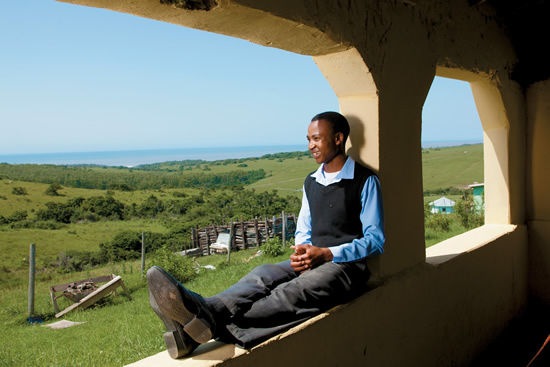 The department and Sants recognised that the cost of enrolling in a university away from home doubled for students from rural areas. So after registration, students were trained at nine student support centres across KwaZulu-Natal.
The department and Sants recognised that the cost of enrolling in a university away from home doubled for students from rural areas. So after registration, students were trained at nine student support centres across KwaZulu-Natal.
Teaching students close to home kept costs down and allowed the students to stay in their communities. These new graduates now have the opportunity to have a positive impact in their often marginalised, rural and inaccessible communities.
We are the change
Graduate Senza Mguni of Vryheid says the hard work was worth it.
“We had no idea where this path would take us. But we are here today because we were passionate about what we were doing. We are the change that is required in our schools.”
Professor Jean Baxen, executive academic director at Sants, is proud that the graduates have proven themselves in the classroom while doing their practice teaching sessions in their third year.
“Teaching is not merely about knowing the content,” she says. “Rather, it is about knowing how to take the content and reproduce it in a way that produces optimal learning outcomes for all children.”
Teaching in isiZulu
For Sants, the programme is a way of living the Constitution’s protection of access to quality education as a human right.
A 2015 Centre for Development and Enterprise report found that there would be a need for 30 000 new teachers every year up to 2030. The shortage would be especially critical in the foundation phase, and among indigenous language teachers.
Graduates were originally targeted for their desire to remain in their communities after completing their studies. But they were also chosen for their ability to learn in English and teach in isiZulu.
Computer lab opens doors of education at rural school
Computer lab opens doors of education at rural school LondekileA few years ago Sigidisabathembu Primary in KwaZulu-Natal was just two shacks with no windows and doors. Today it is a brick school with a new high-tech computer laboratory, recently handed over by the Department of Science and Technology.
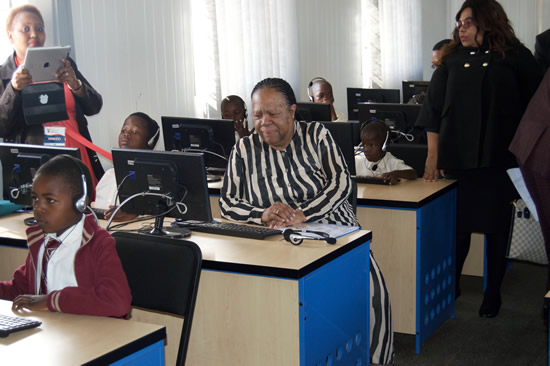 A world of education has opened up for children in the poverty-stricken rural village of Ilenge-Majuqule in Ladysmith, KwaZulu-Natal, thanks to a new high-tech computer laboratory at Sigidisabathembu Primary School.
A world of education has opened up for children in the poverty-stricken rural village of Ilenge-Majuqule in Ladysmith, KwaZulu-Natal, thanks to a new high-tech computer laboratory at Sigidisabathembu Primary School.
Now, instead of travelling long distances to access the internet, learners will get to use it every day. The lab, handed over to the school by the Department of Science and Technology recently, is internet-enabled and equipped with 30 desktop computers, a multimedia printer, external hard drives and a projector.
Nine laptops have been donated for the school’s six teachers, and 19 tablets for Grade R learners to use. Speaking at the handover ceremony, Minister of Science and Technology Naledi Pandor said the school’s students and their educators would now benefit from computer-based learning and teaching programs, providing curricular support for all subjects from Grades R to 7.
Bringing science to rural youth
“The Department of Science and Technology’s Youth Into Science Programme was developed to expand access to science and technology to younger generations in the rural areas,” Minister Pandor said.
“Without science and technology we cannot have change. We would not be able to address the range of difficulties that we face. Through science we will discover a way to curb HIV, and overcome the many other diseases that kill hundreds of thousands of Africans on the continent.
“Science has the answer for many challenges in our societies.”
Sigidisabathembu School Principal Nozipho Mdunge thanked both the Department of Science and Technology, and the Department of Basic Education, for the changes they had brought to the school.
“When I came here in 2008 the school had only two shacks with no windows and doors,” Principal Mdunge said. “When it rained we had to dismiss the learners, because the floors were flooded like a dam.
“We never thought, back then, that this school would develop like this – that we would have brick structures.
“Not to mention this modern, high-tech computer laboratory!”
Grade 7 learner Thalente Shabalala said schoolchildren and the community would no longer have to spend time and money travelling to town to use a computer.
“Town is over an hour away,” Shabalala said. “We used to spend R90 for transport and R20 at the internet cafe, just to access the internet.”
Book your child’s place at school − online
Book your child’s place at school − online LondekileThanks to the Gauteng Education Department’s admissions app, parents and guardians can now go online to select a school for children going into Grade 1 and Grade 8 in 2018.
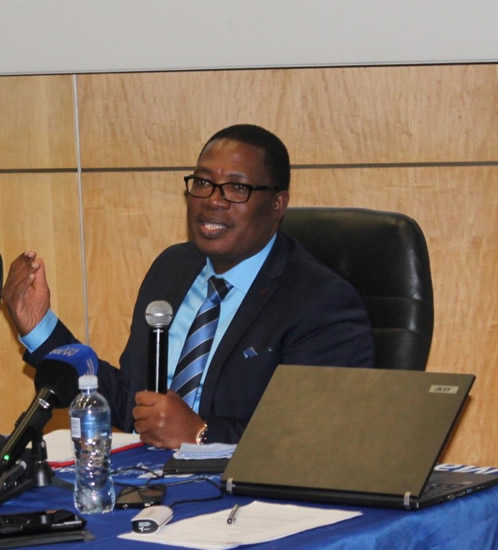 The Gauteng Education Department’s online admissions app is now open for parents and guardians who need to register their children going into Grade 1 or Grade 8 in 2018.
The Gauteng Education Department’s online admissions app is now open for parents and guardians who need to register their children going into Grade 1 or Grade 8 in 2018.
The application system can be used on a desktop computer, tablet or mobile phone. It allows parents to select the school they would like their children to attend. For other grades, parents still have to apply at the school itself.
Online applications close at midnight on 12 June 2017. School placements will be done from 24 June to 29 September 2017.
To apply for a Grade 1 or Grade 8 place for a child in 2018, go to www.gdeadmissions.gov.za and click “Register”. Then follow the instructions.
Once parents have selected the school and completed their online application, they will be sent their school waiting list number via SMS or email.
The next step is to submit supporting documents to the school. Parents will have to take physical copies of documents such as IDs, passports, immunisation cards, birth certificates, proof of address and so on to the school where they are on the waiting list.
Need help?
A video tutorial, a step-by-step guide in pictures, and answers to parents’ frequently asked questions are all available on the website www.education.gpg.gov.za and www.gdeadmissions.gov.za.
Parents needing help with the application process can go to one of the 65 school admission centres across the province.
The Gauteng Education Department has established these centres to guide parents through the admission process, and assist parents who do not have access to the internet.
Basic Education Department spokesperson Elijah Mhlanga said schools in other provinces would have their own online admission application process in place next year.
“The success of the online application process in Gauteng bodes well for the future of the education system in this country, and other provinces will be following suit,” he said.
Healthier choices for a brighter future
Healthier choices for a brighter future LondekileThe new For My Future project will educate young South Africans on the life choices that will help make them happier, healthier adults.
 The government’s recently launched For My Future (FMF) project aims to improve the wellbeing of young people by educating them on the importance of making healthier and better choices in their lives.
The government’s recently launched For My Future (FMF) project aims to improve the wellbeing of young people by educating them on the importance of making healthier and better choices in their lives.
The initiative is a partnership between the Western Cape Department of Health and the national departments of Arts and Culture, Social Development, and Basic Education. Local municipalities and NGOs have also come on board.
More than 250 young people attended the recent launch of the FMF programme at the Harry Comay Tuberculosis Hospital in George, Western Cape.
Lessons for life
Poor nutrition and less active lifestyles are creating a generation of obese and unhealthy children. FMF aims to get kids to adopt healthy behaviour in adolescence, which will become lessons for life.
It will give young South Africans advice on healthy nutrition and the importance of exercise. FMF will also make kids aware of how better self-esteem can make them healthier.
The project is there to help young people to make better life choices.
A resource for everyday living
The Department of Health recognises inactivity as a major risk factor for preventable diseases such as diabetes, hypertension and heart disease. FMF centres will offer safe spaces for youth to play or take part in team sport. They will also offer health screening services for the detection and management of illnesses.
The FMF leaders hope that the programme will expand beyond just the youth to include parents and other adults in encouraging the adoption of healthy, sustainable lifestyles across the community.
The project will also look to build partnerships with other organisations in the communities they serve. For example, partnerships with community gardeners will reinforce the importance of eating less processed food while also supplying fresh vegetables to FMF centres.
The youth at the launch got the chance to vote for the name and logo of the new FMF Youth Centre in Thembalethu, which will open later this year.
They chose “Incubeko”. This means “wisdom” in isiXhosa.
Getting help to tackle substance abuse
Getting help to tackle substance abuse LondekileSubstance abuse is on the rise, especially among the youth.
While it affects individuals, it has the knock-on effect of tearing apart communities and increasing crime rates.
National and provincial health departments’ programmes to combat substance abuse are founded on counselling healthier life choices and promoting active lifestyles.
These services are based in child and youth care centres or, in the Western Cape, at one of their The Mass participation; Opportunity and access; Development and growth (MOD) Programme centres.
Getting help
If you or someone you know needs help with a substance abuse problem your first stop should be your local community centre or clinic.
Here trained medical professionals or social workers will assess you and direct you to the services available in your area.
Don’t ignore the problem. Hoping the problem will go away on its own does not work. The sooner treatment begins the sooner the problem can be beaten.
Ignoring the problem or protecting a loved one from the consequences of their actions will keep them from getting the help they need.
Access to treatment
You can choose to go to a clinic in your community or one outside where you live. With the help of a medical professional, treatment options will be considered and a plan put into place.
Early intervention programmes are community-based and are considered the best option for youth who have only just begun experimenting.
Family of substance abusers and their dependent children can choose a community-based option.
This allows those closest to the patient to be part of the treatment and may help addicts to keep working. This is a more cost-effective option to in-patient treatment.
In-patient treatment would mean an extended stay in a registered treatment facility – usually away from family and familiar temptations.
Treatment would involve medical interventions, if necessary, and counselling.
Aftercare and counselling
Aftercare is vital to recovery. Recovering addicts are encouraged to attend aftercare and counselling for as long as needed.
It is the best way to spot or treat a relapse.
Support groups are vitally important – not just for recovering addicts but for family as well. Talking through a problem and sharing experiences allows addicts and their families to build support networks that will help deal with the stresses associated with addiction and recovery.
The myths
The truth will set you free, they say. Knowing these myths about addiction will aid your recovery or help you help a loved one.
MYTH 1: Overcoming harmful use or dependency is simply a matter of willpower. "You can stop using drugs if you really want to."
FACT: Prolonged exposure to drugs and alcohol alters the brain. These brain changes make it extremely difficult for an individual to quit by sheer force of will.
MYTH 2: Substance use disorder is a disease, so there’s nothing you can do about it.
FACT: Substance abuse is a disease, but that doesn't mean you’re a helpless victim. Dependency can be treated and reversed through therapy, medication, exercise and other treatments.
MYTH 3: People with drug and alcohol disorders have to hit rock bottom before they can get better.
FACT: Treatment and attention to the matter can begin at any point of recovery. The earlier help is obtained, the better.
MYTH 4: You can't force someone into treatment. They have to want help.
FACT: Treatment doesn't have to be voluntary to be successful. Someone who is pressured into treatment can still benefit and make a full recovery from addiction.
MYTH 5: Treatment didn't work before, so there’s no point trying again. Some cases are just hopeless.
FACT: Recovery from substance use disorder is a long process. It often involves setbacks. A relapse doesn't mean that treatment has failed.
Giving hope to breast cancer survivors
Giving hope to breast cancer survivors LondekileFocus on youth
Nneile Nkholise is a young engineer using her knowledge to make the world better for breast cancer survivors – work that has earned her this year’s NYDA President’s Award.
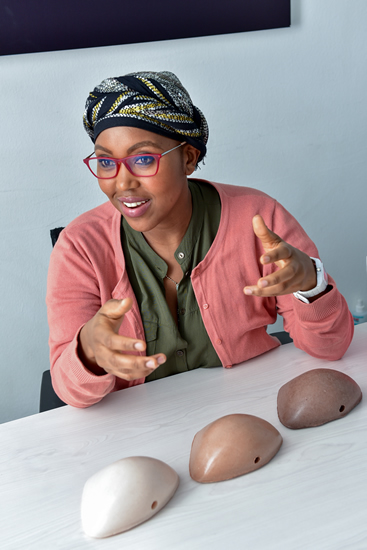 Nneile Nkholise wanted to follow her brother into journalism. Her mother believed she should be an engineer instead.
Nneile Nkholise wanted to follow her brother into journalism. Her mother believed she should be an engineer instead.
Fortunately the young woman listened to her mother and chose mechanical engineering, which spoke to her artist’s soul. “I wanted to carve a new path for myself and be a design engineer because I was creative and wanted to explore that side of engineering.”
As she began to study she started understandiZng there was more to the profession than meets the eye. “It’s not just about cars or production.”
Finding purpose
After graduating from the Central University of Technology she founded iMed Tech, a company that commercialises her research into additive manufacturing in medicine.
The company, currently incubated at the Innovation Hub, manufactures prosthetics for women who have survived breast cancer.
Nkholise found her path in life during a class discussion on how additives could improve the production of facial prosthetics. While the men in her class discussed facial prosthetics, she realised the discussion could easily include breasts.
“Being a woman, and seeing so many women losing breasts because of cancer, I said someone needs to answer that.”
Innovation
Nkholise has built her business on her need to help women who are unable to afford breast reconstruction after a mastectomy. “When someone has undergone mastectomy, the option that person would have is breast reconstruction, and that is very expensive. It can go over R120 000.”
In the beginning Nkholise designed and manufactured a simple prosthetic that had the feel of a real breast. The idea was to give women something they could wear over their scars. Now she is testing a new idea in response to client requests – a prosthetic with a magnet implant. “You can run and jump without it falling and those who use it can go to gym while it is still attached to their body.”
Opportunities for women
Nkholise encourages other young women to consider careers in engineering. Part of her vision for iMed is to employ as many women as possible. She sees this as a way to introduce them to engineering, and to empower them.
Her belief stems from research by the World Economic Forum on the gender gap. It found that young women, especially African women, do not have access to many opportunities.
“I was, in my little way, trying to create opportunities for young women and I believe that I have a responsibility to skill as many young people as I can.”
Invention helps small farmers with ‘green’ footprint
Invention helps small farmers with ‘green’ footprint LondekileFocus on youth
An inspiring woman from the Overberg town of Bredasdorp has invented a carbon footprint calculator that will help small- and medium-sized farms ensure their farming methods are environmentally friendly.
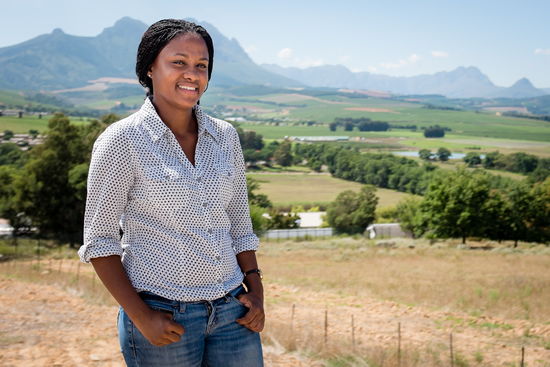 The tool will measure entity-level carbon emissions from the farm and at the same time help farmers identify carbon hotspots on their property.
The tool will measure entity-level carbon emissions from the farm and at the same time help farmers identify carbon hotspots on their property.
The invention is the brainchild of 30-year-old Vanessa Barends, who – despite working in a male-dominated sector – is determined to be a role model and pave the way for young women from rural areas across the Western Cape.
“My passion and love for agriculture, the environment and people is the sphere that I want to be in, it’s the sphere where I see myself growing and contributing,” she says.
The purpose of the calculator is first as a guidance tool to direct the Western Cape Department of Agriculture in assisting smallholder farmers with their carbon footprint and to act as a guidance tool to industry in constructing a more formal carbon calculator for smallholder mixed farming systems, Barends says.
The tool will also provide farming communities with much-needed information to plan for more efficient farming activities and help in reducing costs.
After matriculating from the local Napier High School, Barends started an internship with the provincial Department of Agriculture and went on to obtain a bursary to study a Business Science degree in agricultural economics at Stellenbosch University.
She then enrolled in the Western Cape’s Young Professional Persons Programme, which aims to support black postgraduate students develop their careers. With support via the in-service training and mentorship, Barends completed her Master’s degree. Her dissertation was on the carbon footprint of farming activities.
Today Barends is employed as an agricultural economist with the Western Cape Department of Agriculture and her innovative idea is making waves in the industry.
Early start for this entrepreneur
Early start for this entrepreneur LondekileFocus on youth
Education has been the lever to open doors and get out of poverty for this young businessman from Tshwane.
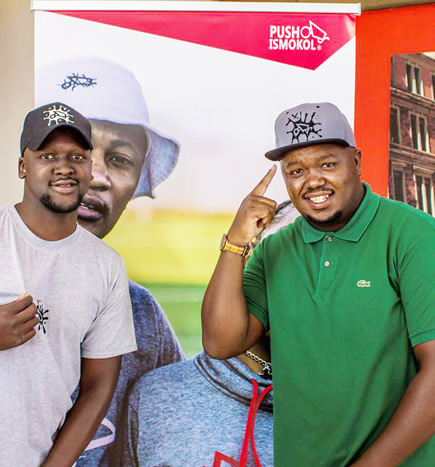 Ask Karidas Tshintsholo and he will tell you that poverty made him an entrepreneur. He was four when the ice cream van drove through his Ekangala township home. Like all children he asked his mother for a treat.
Ask Karidas Tshintsholo and he will tell you that poverty made him an entrepreneur. He was four when the ice cream van drove through his Ekangala township home. Like all children he asked his mother for a treat.
“My mom then grabbed me very tight and looked me in the eyes and said she couldn’t buy that ice-cream, even though she wanted to. But she told me that I am the man of the house and we needed to work together.”
In that moment he realised that his mother provided food and shelter, any extras he would need to work for. Tshintsholo was six when he started his first business, paying kids to make wire cars that he then sold on. Today he is business brain and co-founder, with a designer friend, of Push Ismokol Clothing.
The company designs, manufactures and markets its clothing, caps and sweaters from a factory close to where he grew up. Local manufacturing matters to him.
“I strongly believe in African solutions to African problems. The business is more sustainable in the long run when you grow your own capacity to produce, as opposed to just buying from China and selling.”
Tshintsholo is making his success the foundation for uplifting his community. His factory is based close to his home and he hires from the community. He has been open about creating opportunities and upskilling women and youth from Ekangala, in the City of Tshwane.
“I have been fortunate and now one of my goals is to be able to go and give back, because I know there are a lot of people where I come from who are skilled in ways that the system does not necessarily cater for.”
The University of Cape Town actuarial science graduate believes that the foundation of his success has been education. In Grade 9 his maths marks dropped, he spent the rest of the year working harder and by the end of the year was the top maths student in his school.
“The people who can get out of a township are the people who can either write an essay or solve a maths problem. If you can’t do those things then you are basically trapped because the system doesn’t really cater for those gifted in other ways, such as with their hands.”
Tshintsholo’s success has not gone unnoticed. He was a finalist for the Anzisha Prize, Africa’s biggest prize for young entrepreneurs and business disruptors. He has also been selected as an Allan Gray Orbis Foundation fellow. The fund is the investment management firm's investment in young entrepreneurs, providing access to education and entrepreneurial development..
Diamond Hub creates community entrepreneurs
Diamond Hub creates community entrepreneurs LondekileFocus on youth
Bored with his job and depressed by the poverty and unemployment he saw around him in Kimberley’s Galeshewe township in the Northern Cape, 25 year-old Edward Boitumelo Matlwane needed a new start.
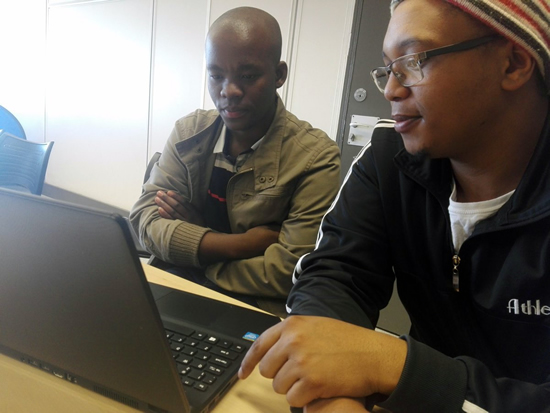 “Every day, I did the same thing. I could not take it anymore. I felt old,” he said.
“Every day, I did the same thing. I could not take it anymore. I felt old,” he said.
So Matlwane quit a job he had held for over four years. He wasn’t sure what exactly he wanted to do, but he had always had a passion to become an entrepreneur.
He spent a year doing research, and realised along the way that he knew nothing about entrepreneurship. He had reached a stalemate.
To his dismay, it became clear that the people he approached for help were also clueless about entrepreneurship. There was no-one to mentor him.
Right there, Matiwane had a light-bulb moment. He saw the opportunity of starting an entrepreneurship hub, to create a culture of entrepreneurship in his community.
Along with five friends who shared his vision, Matlwane registered a non-profit organisation – and the Diamond Creative Vision Hub was born.
Building leadership
Today, the organisation is staffed by academics, students and professionals from diverse fields but with a common passion for youth entrepreneurship.
The aim is to create a mindset of entrepreneurship and wealth creation among the youth by offering unique insights into the qualities that drive successful leaders.
The hub teaches a number of different courses. One is the Entrepreneur Development Programme, a simplified masters in business administration, or MBA.
They took MBA curriculum material donated by the University of the Free State and broke it down to its simplest form to create a training course for young people.
Another is the Entrepreneurs in the Classroom course, which teaches business skills to learners from schools in the area.
Working with government
The Diamond Creative Vision Hub also advises local government. Matlwane and his partners are part of the Frances Baard district municipality’s small, medium and micro enterprise (SMME) development committee.
They also have partnership agreements with the National Youth Development Agency and the Small Enterprise Finance Agency.
Matlwane’s experience allows him to spot business opportunities in even the poorest communities.
Recently, he visited a small community of Schmidtsdrift, 80 kilometres west of Kimberley. He now has a five-year contract to provide entrepreneurship programmes there.
“Our job is to develop the rural community into a self-sustained community,” he said.
“We are going to do that by using their natural resources, the land, river and the fact that the place is rich with diamonds.”
Matlwane’s ultimate goal is to create wealth among black township youth, to break the chain of inter-generational poverty.
Mthatha park to get entrepreneurs working
Mthatha park to get entrepreneurs working LondekileThe Vulindlela Heights Industrial Park in Mthatha was recently upgraded to the tune of R22-million to increase manufacturing in the region and allow entrepreneurship to thrive.
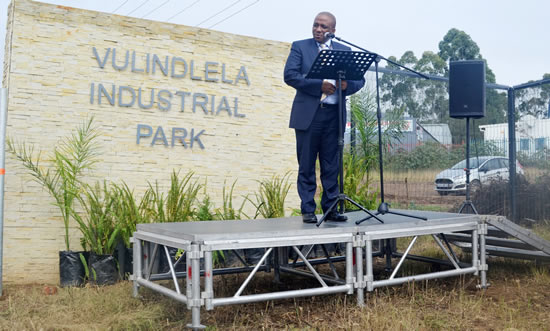 Government’s plans to attract manufacturing to the Eastern Cape are taking shape with the recent revamp and launch of the Vulindlela Heights Industrial Park in Mthatha.
Government’s plans to attract manufacturing to the Eastern Cape are taking shape with the recent revamp and launch of the Vulindlela Heights Industrial Park in Mthatha.
To develop industrial activity in the area, the Department of Trade and Industry (the dti) recently injected R22- million into upgrading the Vulindlela Heights site, which falls under the King Sabata Dalindyebo Local Municipality.
It is one of a number of parks the dti has recently upgraded across South Africa, with a total investment of R189- million.
At the launch of the Vulindlela Heights site, Sipho Zikode, Deputy Director-General of Special Economic Zones and Economic Transformation at the dti, said the R22 million investment was to create an enabling environment for entrepreneurship to thrive.
He called on entrepreneurs to take advantage of the new infrastructure and put their efforts into manufacturing.
“While government is providing the infrastructure, businesspeople must stand up, roll up their sleeves and work hard,” said Zikode.
The revitalisation of Vulindlela Heights was part of efforts to decentralise industrial activity, so as to deepen and strengthen South Africa’s industrial base.
“The purpose of the programme is to upgrade the country’s state-owned industrial parks in order for them to contribute in growing the country’s economy and creating jobs,” said Zikode.
Significant milestone
Vulindlela’s tenant mix includes manufacturers and other businesses supplying products and services to the local market. It currently employs 866 people, full time.
Richard Mnqokoyi, director of local economic development at King Sabata Dalindyebo Local Municipality, welcomed the dti’s contribution.
“This marks a significant milestone in our plans to grow the economy of Mthatha,” Mnqokoyi said.
“The objective of the initiative is to increase the capacity of the park as an industrial hub, thereby attracting more investments which will create employment and boost our economy.”
Over 100 jobs were created during the upgrade, which included the construction of a boundary fence and roads, and the installation of a waste skip structure, CCTV system and electrical infrastructure.
Special Economic Zone
“As an industrial park, Vulindlela is a beehive of economic activity as there are many big companies and small enterprises that are located in the park and are doing business,” said Mnqokoyi.
“But we would like to reposition it to be part of the Special Economic Zone (SEZ) that is planned for Mthatha and make vacant space in the park available for more investments.”
SEZs are areas designated for targeted economic activities, so as to attract investors. They are supported by government with incentives, infrastructure and systems.
Buhle Dlulane, CEO of the Eastern Cape Development Corporation, said the launch of the park brought hope to the community.
“The park currently has 87 per cent occupancy,” Dlulane said. “The more occupants it attracts, the more jobs it will create and the tax base will increase.
“It is important to broaden the scope to attract investors, diversify the economy that will be able to carry us even when times are tough. This creates jobs and addresses the high level of poverty and inequality in the region.”
New Rand West City Mall boosts local economy
New Rand West City Mall boosts local economy LondekileThe new Tambotie Mall in Randfontein has not only created hundreds of jobs, it’s also keeping local buying power in the community, helping to grow the town’s economy.
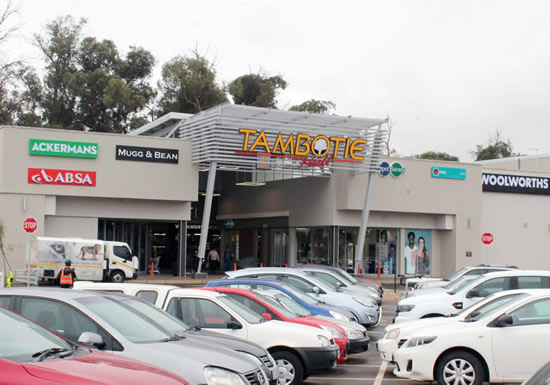 A new mall in Randfontein west of Johannesburg has created more than 1 300 job opportunities, benefitting residents of the Rand West City Local Municipality.
A new mall in Randfontein west of Johannesburg has created more than 1 300 job opportunities, benefitting residents of the Rand West City Local Municipality.
Tambotie Mall, recently launched by Mayor Mzi Khumalo and local business leaders, is set to boost economic activity in the region.
Of the 1 300 jobs created, more than 400 are permanent.
Bringing change
Mayor Khumalo says the mall has revived Rand West City and turned it into an investment destination.
“We really are thrilled about the construction of the new mall in our town and together with the developers, we feel like this will bring about change,” he says.
“More than 1 000 locals benefited from the project in its building phase.
“We wanted a situation where more and more locals benefit from developments happening in their own region, and this is one of them.”
The Mayor says the merger of the Randfontein Local Municipality and the Westonaria Local Municipality to create Rand West City Local Municipality has increased the town’s buying power. Now that residents can shop locally at the new mall, the town’s economy will go up.
Putting food on the table
Local resident Xoliswa Mokoena says her hopes for a permanent job were answered by the construction of the mall.
“Things were really tough,” she says. “This mall gave me and my family new hope and will help me put food on the table.”
Mokoena adds that her heart fills with joy every morning when she travels to work with other people from her community who were also once unemployed.
Businessman Jimmy Pappas is the previous owner of the land on whi ch the mall was built. He says the mall was his late father’s dream, and is “thrilled to see it come to life”, for the benefit of the entire community.
Rape survivors get comfort and dignity at Thuthuzela Care Centres
Rape survivors get comfort and dignity at Thuthuzela Care Centres lebangYouth
Working with police and health services, the 55 Thuthuzela Care Centres across South Africa give specialised services and support to the survivors of sexual violence, and help them find justice in court.
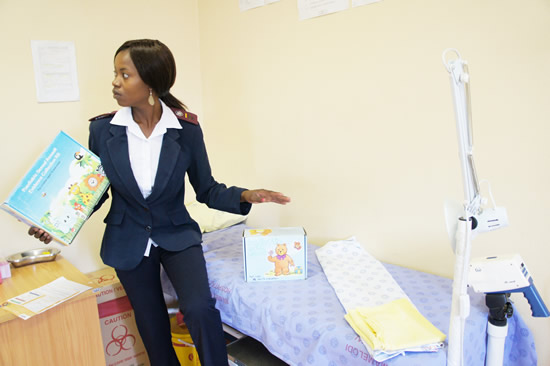 Thuthuzela means comfort in isiXhosa. In communities across South Africa, Thuthuzela Care Centres offer comfort, medical care, access to the legal system and counselling for survivors of sexual violence.
Thuthuzela means comfort in isiXhosa. In communities across South Africa, Thuthuzela Care Centres offer comfort, medical care, access to the legal system and counselling for survivors of sexual violence.
The centres are a partnership between donors and government departments under the leadership of the National Prosecuting Authority’s Sexual Offences and Community Affairs Unit (Soca).
Thuthuzela centres are a critical tool in government’s integrated strategy to combat sexual violence. The centres link police stations with clinics and hospitals and the re-established sexual offences courts.
But the Thuthuzela centres’ most important role is to support victims. The philosophy is respect, comfort, restoring dignity and ensuring justice for children and women who are victims of sexual violence.
Restoring dignity
Reporting a rape can be terrifying and overwhelming. Under government’s new strategy, victims are given privacy at police stations in rooms reserved for them. There they can quietly wait for an ambulance to take them to a Thuthuzela Care Centre, which is usually at a clinic or hospital.
Trained counsellors are with the victim the whole time – at the police station and in the ambulance. At the Thuthuzela centre they are met by a social worker who explains the next steps. These are a visit to the doctor, a shower and change of clothes, and a statement to a trained special victims police officer.
While the victim is giving a statement, the doctor prescribes and dispenses medication – including emergency contraceptives and antiretrovirals – and sets up an appointment for a return visit. Once the process is complete, the counsellor takes the victim home, or to a place of safety.
“Service providers are available to a rape survivor in one location, rather than her being shuttled around throughout the criminal justice system,” says Advocate Thoko Majokweni, director of Soca.
Child victims
When doctors at Thuthuzela Centres began reporting an increase in young victims they approached Unicef, an international children’s NGO, for help.
Unicef helps train child-friendly nurses and caregivers, and provides specialised services to prepare children for court. They also helped fund the revamp of children’s areas at the centres.
“The idea is to ensure a child-friendly environment right from the start – from the crime-reporting stage all the way through to the provision of follow-up victim support services,” said Unicef child protection specialist Patrizia Benvenuti.
Improving conviction rates
Very few – as low as 4 per cent – of reported rapes lead to successful convictions. One reason for this is that victims find the trial process frightening. To make trials less intimidating, Thuthuzela staff, prosecutors, investigating officers and social workers are assigned to special Sexual Offences Courts.
The courts “are a critical part of South Africa’s anti-rape strategy, aiming to reduce secondary trauma for the victim, improve perpetrator conviction rates and reduce the lead time for finalising cases,” says Advocate Majokweni.
Communities lucky enough to have Thuthuzela centres – government is building more – have seen an increase in victims reporting rape, and conviction rates have gone up.
“A sign of hope and comfort.” That’s how one rape survivor described the Thuthuzela centre where she received help.
Services offered at Thuthuzela Centres
- Comfort from a coordinator or nurse who will explain the medical procedures and what clothing will be taken as evidence.
- Medical consent forms are explained.
- A nurse will accompany victims throughout the procedure.
- A bath or shower after evidence is collected, and fresh clothing will be provided.
- The investigating officer stationed at the centre will take a statement.
- Nurses or social worker will offer counselling.
- Medication is prescribed.
- A follow-up medical appointment is scheduled.
- A referral for long-term counselling is provided.
- Survivors are given rides home or to a place of safety.
- Consultation with a specialist prosecutor before the case goes to court.
- An explanation of the verdict after the trial.
Report sexual violence
In light of the heightened awareness of crimes against women and girls, government has set up a Gender Based Violence Command Centre. You can call 0800 428 428 or send a “please call me” to *120*7867#
Ferry brings hope to island fishing village
Ferry brings hope to island fishing village lebangIsolated for 200 years, the fishing community from the island village of Enkoveni in KwaZulu-Natal can now safely cross crocodile-infested waters to get to school and economic opportunities, thanks to a new ferry.
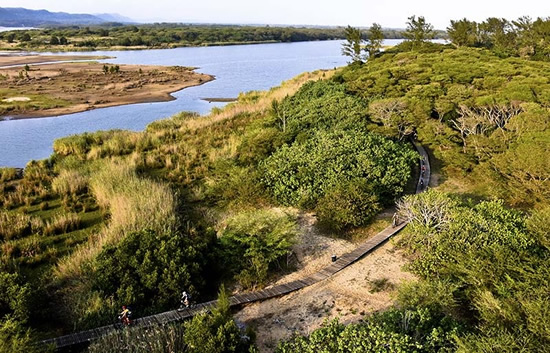 The village of Enkoveni is a community of 80 homesteads, and a primary school. It lies on an island in the far north of KwaZulu-Natal, inside the iSimangaliso Wetland Park – South Africa’s first Unesco World Heritage Site.
The village of Enkoveni is a community of 80 homesteads, and a primary school. It lies on an island in the far north of KwaZulu-Natal, inside the iSimangaliso Wetland Park – South Africa’s first Unesco World Heritage Site.
For 200 years, people from this fishing community wanting to get to the mainland had to brave waters infested with crocodiles and hippos.
“My father and his father both lived on that island,” says Lindani Ngubane. “They were catching fish and selling it here before anyone even knew this place existed.” Ngubane works for the Masifundise Development Trust, an organisation that helps fight for the rights of local fishermen.
Today, the journey across the water is safe.
A brand new ferry means children from the mainland attending primary school on the island, and students travelling in the opposite direction to the nearest high school, can cross the bay without fear of being attacked.
Ferry brings jobs
The petrol-powered ferry is run every day by skippers trained at the KwaZulu-Natal Sharks Board Maritime Centre of Excellence. The eight skippers – four women and four men – are all previously unemployed youth from the community. They are now responsible for operating and managing the boats.
The initiative comes out of the South African Maritime Safety Authority’s Umhlabuyalingana Outreach Project. This aims to bring immediate and long-term relief to the community.
They have been joined by the KwaZulu-Natal Department of Education, the national Department of Transport and a host of private sector partners.
The beginning of development
Being isolated should not prevent a child from getting an education, KwaZulu-Natal Education MEC Mthandeni Dlungwane said at the handover of the ferry.
“We see the difficulty these children face every day. There are hippos in the lake. It is for this reason that we are trying. This is a government for the people by the people,” Dlungwane said.
The island community hopes the ferry is the beginning of the development of the area. They would like government to build a bridge as well, and connect them to the national power grid.
Speaking at the handover, Deputy Minister of Transport Sindisiwe Chikunga said the responsibility of filling all the community’s needs fell across different ministries.
“We think this is a community that has potential,” Chikunga said. “This lake has fish. They can sell it. We need to bring other departments here to see how we can help further.”
New deeds office for Limpopo
New deeds office for Limpopo lebangThe people of Limpopo no longer have to travel long distances to register their properties at the deeds office.
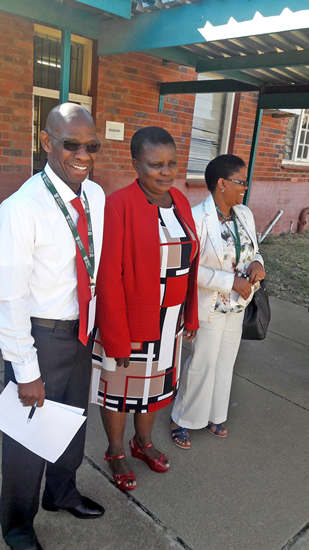 The Department of Rural Development and Land Reform has opened first-ever Limpopo Deeds Registry in Polokwane.
The Department of Rural Development and Land Reform has opened first-ever Limpopo Deeds Registry in Polokwane.
Deputy Minister Mcebisi Skwatsha says the historic opening of the office is part of strengthening government’s commitment to provide better access to deeds services for the people of the province.
“We are bringing the service closer to the people. We hope the people of Limpopo will take advantage of this office.”
Previously, over 300 000 Limpopo land parcels were handled by the Pretoria Deeds Registry, and a further 200 000 by the Mpumalanga Deeds Registry.
Services for the broader citizenry
“The benefits of this important milestone are two-fold,” Deputy Minister Skwatsha says. “Firstly, it will serve in the interest of the promotion of better and accessible services that are decentralised, to the broader citizenry of the province.
“Secondly, there will be increased access to information and deeds registration services.
“Both benefits will result in improved service delivery that is client-centric.”
The new office is at 101 Dorp Street near the Provincial Hospital in Polokwane, in the Capricorn district. The Office of the Surveyor General is in the same building.
What does a Deeds Office Registry do?
The Deeds Office is responsible for the registration, management and maintenance of the property registry of South Africa.
You can get the following information from the deeds registry:
- The registered owner of a property
- The conditions affecting such property
- Interdicts and contracts in respect of the property
- Purchase price of the property
- Rules of a sectional title scheme
- A copy of an antenuptial (marriage) contract, deeds of servitude, mortgage bonds, and so on
- A copy of a sectional title plan
Steps to get a copy of a deed or document from a deeds registry:
- Physically go to the deeds office
- Go to the information desk where an official will help you complete a the necessary form and explain the procedure
- Request a search on the property
- Pay the required fee at the cashier’s office.
Information can also be accessed at www.deeds.gov.za. For more information on the deeds registry call 0800 007 095.
Life-saving facilities at Randfontein’s high-tech clinic
Life-saving facilities at Randfontein’s high-tech clinic lebangThe Gauteng government’s new Randgate Clinic in Randfontein, west of Johannesburg, has modern facilities to ensure the best care for local residents.
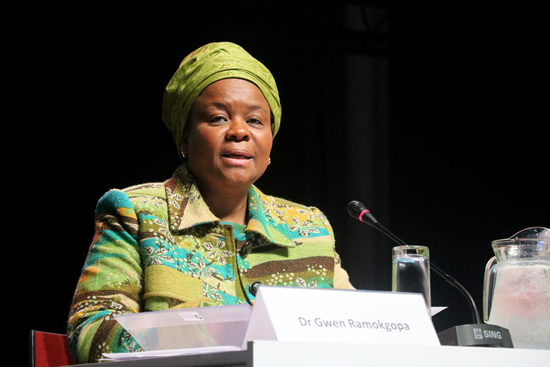 A state-of-the-art clinic recently launched at Randfontein in Rand West City Local Municipality, west of Johannesburg, will give residents a second facility to meet their healthcare needs.
A state-of-the-art clinic recently launched at Randfontein in Rand West City Local Municipality, west of Johannesburg, will give residents a second facility to meet their healthcare needs.
At the launch, Gauteng Health MEC Gwen Ramokgopa said strides are being made in improving South Africa’s health sector.
“We are really happy about this state-of-the-art facility, which will improve services offered in the region.
“This clinic is one of the deliverables which we had set for ourselves within the first 100 days in office,” MEC Ramokgopa said.
“It was functioning for a month prior to its official launch, in order to get feedback from the community.”
Ramokgopa added that the clinic has the capacity required by the doctors, nurses and specialists servicing the community.
Mothers and children
Built at a cost of R40 million, Randgate Clinic provides maternal and child health services, and has life-saving facilities for emergency births. It also provides treatment for chronic illnesses such as TB and HIV.
The clinic services residents from Brandvlei, Elandsfontein, Louwmarina, Helikonpark, Greenhill and other areas in the region.
It also has an outreach team that visits schools, and goes to patients’ homes to ensure compliance with treatment for TB, HIV and other conditions.
The clinic offers the services of specialists that include social workers, a dietician and a dentist.
No more queues
Rand West City Local Municipality Mayor Mzi Khumalo said his municipality is grateful to the provincial government for building the clinic.
“It will service numerous communities in the area and will relieve the existing clinic in Randfontein,” said Khumalo.
Local resident Tony Baloyi says long queues at the older clinic will now be a thing of the past.
“I’m sure I speak for others when I say, it will definitely make our lives easier,” said Baloyi
Halaal processing park has global potential
Halaal processing park has global potential lebangA proposed new Agricultural Park in the Western Cape will process halaal products for the Muslim community – and tap into the US$2.3-trillion global halaal market.
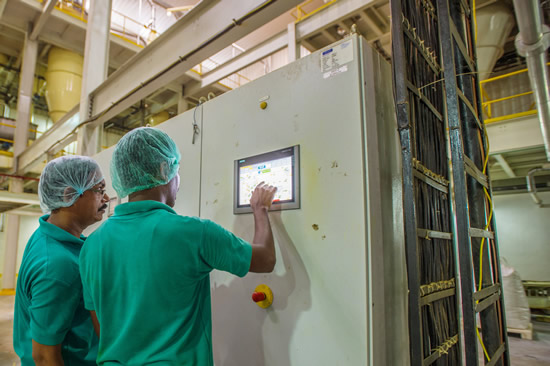 The Western Cape government is looking to attract local and international investors to drive its ambitious plans to establish a halaal agriprocessing park.
The Western Cape government is looking to attract local and international investors to drive its ambitious plans to establish a halaal agriprocessing park.
The project aims to capture a slice of the growing US$2.3-trillion global halaal market, producing food that complies to Islamic dietary laws.
The potential economic growth in the province could create thousands of jobs.
The proposed park would be part of a cluster of manufacturing firms in the halaal industry.
“Business must be market-driven and private sector-led, with the provincial government playing an enabling, or seeding, role,” said Member of the Executive Council for Economic Opportunities Alan Winde.
Potential sites
MEC Winde said the phase two feasibility study of the halaal park was underway. This would assess three sites – Cape Town International Airport, Klapmuts and Lynedoch in Stellenbosch – selected during the phase one prefeasability study completed in 2016.
“The three sites were chosen out of an original 19 as the most desirable following investigations into their zoning, ownership and physical characteristics,” he said.
In the second phase, the three shortlisted sites will be thoroughly assessed.
“We are developing investor prospectuses for each site, with a focus on all aspects including potential financial models, environmental impact, the site’s access to transport and potential incentives which government is able to offer to enhance the attractiveness of a potential build programme.”
Growing enterprises
MEC Winde said they were also developing a fourth, general investor prospectus detailing overall opportunities in the Western Cape’s halaal industry.
“Through these prospectuses, developers and investors will be able to assess the strategic value of undertaking the private development of a park.”
There would soon be several significant developments in the local halaal industry, he added.
“We have completed the halaal value chain analysis, from which we identified a set of strategic support areas. From this, we are developing a strategy framework.”
To ensure that local suppliers will benefit from the growth in the halaal industry, the Western Cape Department of Economic Development and Tourism is also completing a supplier development strategy to help local small businesses to increase production.
“Once we have completed this, we will embark on a drive to support 30 local entrepreneurs from across the province to grow their enterprises.”
Jobs: Social Development - Jun 2017
Jobs: Social Development - Jun 2017 Estelle GreeffManagement echelon
Director: Media Relations and Content Development, Ref: D2/2017
Chief Directorate: Communications
Total cost-to-employer package: R898 743 per annum (This inclusive remuneration package consists of a basic salary, the states’ contribution to the Government Employees Pension Fund and flexible portion that may be structured i.t.o. the applicable rules.)
Centre: HSRC Building, Pretoria
Requirements: An undergraduate qualification (NQF level 7) as recognized by SAQA PLUS 5 years of experience at a middle/senior managerial level. Knowledge of the relevant Public Service legislation.
Competencies - Presentation and facilitation skills. Financial performance monitoring and evaluation skills. Strategic capability and leadership skills. Programme and project management skills. Financial management skills. Policy analysis and development skills. Communication (verbal and written) skills. Service delivery innovation skills. Problem solving and change management. Economic and statistical analysis skills. People Management and empowerment skills. Client orientation and customer focus skills. Stakeholder management skills.
Attributes - Good interpersonal relationship. Ability to work under pressure. Innovative and creative. Ability to work in a team and independently. Adaptability. Diplomatic. Independent thinker. Cost consciousness. Honesty and integrity.
Duties: Develop, implement and monitor media, strategies and plans. Provide content development services for the Minister, Deputy Minister and DSD. Facilitate intergovernmental relations on communication matters. Record and follow up on decisions taken at Minister’s and Deputy Minister’s meetings. Provide speechwriting and communication support to Minister. Liaise with other government departments and provinces to align communications and media campaigns.
Note: In terms of the Chief Directorate’s employment equity targets, African and Coloured males, African females as well as persons with disabilities are encouraged to apply.
Enquiries Ms L Oliphant, Tel: 012 312 7653
Applications: The Director General, Department of Social Development, Private Bag X901, Pretoria, 0001, Physical Address: HSRC Building, 134 Pretorius Street, Pretoria
For attention: Ms E Steenkamp
Closing date: 15 June 2017
Note: A curriculum vitae with a detailed description of duties and the names of two referees must accompany your application for employment (Z83). It will be required of the successful candidate to undergo an appropriate security clearance. It is our intention to promote representivity (race, gender and disability) in the Public Service through the filling of this post and candidates whose transfer / promotion / appointment will promote representivity will receive preference. An indication in this regard will facilitate the processing of applications. Applicants must please note that they will be required to show proof of original qualifications during the selection process. Correspondence will be limited to successful candidates only. If you have not been contacted within three months after the closing date of this advertisement, please accept that your application was unsuccessful. It is the applicant’s responsibility to have foreign qualifications evaluated by the South African Qualification Authority (SAQA). All shortlisted candidates will be subjected to a technical exercise that intends to test relevant technical elements of the job, the logistics of which will be communicated. Following the interview and technical exercise, the selection panel will recommend candidates to attend a generic managerial competency assessment (in compliance with the DPSA Directive on the implementation of competency based assessments). The competency assessment will be testing generic managerial competencies using the mandated DPSA SMS competency assessment tools. The successful candidate for a SMS post will sign an annual performance agreement, complete a financial discloser form and will also be required to undergo a security clearance. Personnel suitability checks will be conducted on short listed candidates and the appointment is subject to positive outcomes of such checks. Applications received after the closing date will not be taken into consideration. No faxed or e-mailed applications will be considered.
“The Department of Social Development supports persons with disabilities.”
It is our intention to promote representivity (race, gender and disability) in the Public Service through the filling of this post and candidates whose transfer / promotion/ appointment will promote representivity will receive preference.
Bursaries: Agriculture, Forestry and Fisheries 2018
Bursaries: Agriculture, Forestry and Fisheries 2018 Estelle GreeffThe Department of Agriculture, Forestry and Fisheries Bursary Awards for 2018
The Department of Agriculture, Forestry and Fisheries (DAFF) intends to award comprehensive bursaries to qualifying applicants pursuing and/or intending to further their studies in critical scarce skills in the agricultural, forestry and fisheries sectors for the 2018 academic year. The bursary will cover tuition, accommodation, books, meals and monthly allowance. The bursary awards target the previously disadvantaged and impoverished persons from poverty-stricken and rural communities. People with disabilities are encouraged to apply.
Fields of study - Minimum requirements (National Senior Certificate)
1. BSc Bioresource Engineering (Agricultural Engineering) - Mathematics and Physical Science 6 (70–79)
2. Bachelor of Veterinary Science (BVSc) - Mathematics and Physical Science 6 (70–79)
3. BSc Viticulture and Oenology - Mathematics and Physical Science 5 (60–69)
4. BSc Plant Pathology- Mathematics and Physical Science 5 (60–69)
5. BSc Food Science- Mathematics and Physical Science 5 (60–69)
6. BSc Entomology - Mathematics and Physical Science 5 (60–69)
7. BSc Forestry and Wood Science - Mathematics and Physical Science 5 (60–69)
8. BSc Marine Biology - Mathematics and Physical Science 5 (60–69)
9. BSc Oceanography and Marine Biology - Mathematics and Physical Science 5 (60–69)
10. BSc Ichthyology specialising in Aquaculture - Mathematics and Physical Science 5 (60–69)
11. National Diploma: Food Technology - Mathematics and Physical Science 4 (50–59)
12. National Diploma: Forestry- Mathematics and Physical Science 4 (50–59)
13. National Diploma: Marine Science- Mathematics and Physical Science 4 (50–59)
14. Postgraduate studies (BTech, BSc, Hon, MTech, MSc, DTech and PhD.) in different agricultural, forestry and fisheries fields of study relating to DAFF priority research projects. Successful candidates will be appointed as interns and placed with the relevant industry/research institution/institution of higher learning as young professionals. Successful candidates will also be allocated a mentor and will receive a monthly allowance from the department.
Notes
1. It is worth noting that certain fields of study are only available at certain institutions of higher learning:
- B.Sc. Bioresource Engineering (Agricultural Engineering): University of KwaZulu-Natal
- Bachelor of Veterinary Science (BVSc.): University of Pretoria
- B.Sc. Viticulture and Oenology: University of Stellenbosch
- B.Sc. Forestry and Wood Science: University of Stellenbosch
- B.Sc. Oceanography and Marine Biology: University of Cape Town
- B.Sc. Ichthyology specialising in Aquaculture: Rhodes University
- National Diploma: Forestry: Nelson Mandela Metropolitan University
- National Diploma: Marine science: Cape Peninsula University of Technology
2. Applicants must be South African citizens.
3. Applicants must complete the relevant bursary application forms available from the website address: www.daff.gov.za under vacancies.
4. Applicants who apply for fields of study that are not listed above will not be considered.
5. Please note that communication will be limited to successful applicants only. If you have not received any communication from the department by15 January 2018, after the National Bursary Committee has finalised the selection process, consider your application unsuccessful.
6. All completed bursary application forms together with certified copies of ID and certificates/performance results should be sent to the following address:
The Director
Directorate: Sector Education and Training Department of Agriculture, Forestry and Fisheries
Private Bag X250
Pretoria 0001
For further enquiries please contact:
Mr Vusimuzi Mngomezulu: 012 319 7923
Ms Boitumelo Maleka: 012 319 7024
NB. (i) The Department of Agriculture, Forestry and Fisheries reserves the right to determine the total number of bursary allocations for the academic year based on the total budget available.
(ii) The National Bursary Committee will make use of the Bursary Scheme’s 14-point system to allocate points to shortlisted applicants.
(iii) The Bursary Scheme of the Department of Agriculture, Forestry and Fisheries is in fulfilment of the sector strategic objective of elimination of skewed participation in the agricultural, forestry and fisheries sectors.
Closing date for all applications: 30 September 2017
Jobs: Labour Jun 2017
Jobs: Labour Jun 2017 Estelle GreeffAssistant Director: Risk Management
Centre: Provincial Office: Western Cape
Reference No: HR 4/4/10/183
Salary: Commencing: R334 545 per annum
Enquiries: Ms Z Maimane Tel: 021 441 8125
Provincial office: Chief Director: Provincial Operations: Western Cape, Department of Labour, PO Box 872, Cape Town, 8000
Closing date for applications: Monday, 19 June 2017 at 16:00
For full details of the advertised posts visit our website: www.labour.gov.za
Applications must be submitted on form Z83, obtainable from any Public Service Department or on the internet at www.gov.za/documents. The fully completed and signed form Z83 should be accompanied by a recently updated, comprehensive CV as well as recently certified copies of all qualification(s) including a Senior Certificate and ID-document [Driver’s license where applicable]. Non-RSA Citizens/Permanent Resident Permit Holders must attach a copy of their Permanent Residence Permits to their applications. Should you be in possession of a foreign qualification, it must be accompanied by an evaluation certificate from the South African Qualification Authority (SAQA). Applicants who do not comply with the above-mentioned requirements, as well as applications received late, will not be considered. The Department does not accept applications via fax or email. Failure to submit all the requested documents will result in the application not being considered. Correspondence will be limited to short-listed candidates only. If you have not been contacted within eight (8) weeks after the closing date of this advertisement, please accept that your application was unsuccessful. Suitable candidates will be subjected to a personnel suitability check (criminal record, citizenship, credit record checks, qualification verification and employment verification). Where applicable, candidates will be subjected to a skills/knowledge test. All shortlisted candidates for SMS posts will be subjected to a technical competency exercise that intends to test relevant technical elements of the job, the logistics of which be communicated by the Department. Following the interview and technical exercise, the selection panel will recommend candidates to attend generic managerial competencies using the mandated DPSA SMS competency assessment tools. Successful candidates will be appointed on a probation period of 12 months. The Department reserves the right not to make any appointment(s) to the above post. The successful candidate will be expected to sign a performance agreement. The Department of Labour is an equal opportunity affirmative action employer. The employment decision shall be informed by the Employment Equity Plan of the Department. It is the Department’s intention to promote equity (race, gender and disability) through the filling of this post(s) with a candidate whose transfer / promotion / appointment will promote representativity in line with the numerical targets as contained in our Employment Equity Plan.
Stay in touch with the department, visit: website: www.labour.gov.za | Facebook: Department of Labour | twitter: @deptoflabour
South Africa strengthens ties with Tanzania
South Africa strengthens ties with Tanzania lebangAfrica news
It was important for the countries of Africa to work together to achieve the developmental goals they were all striving for, President Jacob Zuma said during a recent visit to Tanzania.
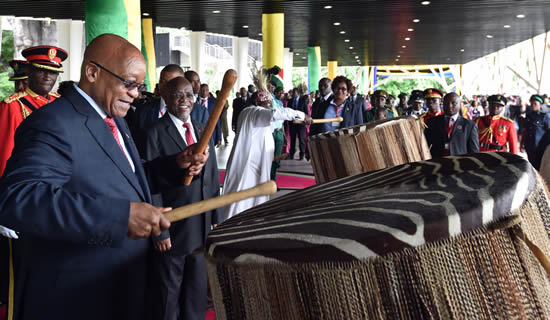 President Jacob Zuma believes Tanzania’s history of support during the apartheid years must serve as inspiration as South Africa and Tanzania face the challenges of unemployment, inequality and poverty in both countries.
President Jacob Zuma believes Tanzania’s history of support during the apartheid years must serve as inspiration as South Africa and Tanzania face the challenges of unemployment, inequality and poverty in both countries.
He was speaking at a recent State Banquet hosted by Tanzanian President John Magufuli in Dar es Salaam. President Zuma added that South Africa and Tanzania needed to strengthen the ties between them, to improve intra-African trade.
“For the changing Africa which Mwalimu (Mwalimu Julius Nyerere) spoke about to achieve the developmental goals and objectives we are all striving for, we have no choice, absolutely no choice but to work together.”
During the visit President Zuma and President Magufuli reviewed and discussed ways to strengthen existing economic relationships between the two countries.
The softening of border controls and barriers to trade would help implement the African Union Agenda 2063 and create inclusive growth on the continent.
Speaking to media before his return to South Africa, President Zuma said: “We are very content with the outcomes of the visit as we openly discussed and agreed on various issues, particularly economic cooperation including private sector investments, infrastructure development, agroprocessing, beneficiation as well as trade and investment.”
Opportunities for public and private sector
During the visit President Zuma addressed the South Africa-Tanzania Business Forum. The business association is made up of public and private sector enterprises and works to find projects that are mutually beneficial to both countries.
“We had a successful engagement with business from both countries. We have agreed to invest in energy and infrastructure, among other priorities, to address the economic development challenges and remove trade barriers in order to facilitate intra-Africa trade and regional integration.”
At the same meeting President Magufuli invited South African state-owned enterprises and the private sector to find opportunities in the major infrastructure projects his new administration was planning.
Most important of those is the railway projects that connect all the countries of the Great Lakes region.
Peace and security
A united Africa promised not only economic growth but was also the best way for the continent to ensure a peaceful and stable future for all.
Tanzania’s position makes the country unique, as both a member of Southern African Development Community and of the East African Community. On issues of peace and stability, President Magufuli is able to share and shape the visions of both organisations.
President Zuma ended his remarks with a quote from OR Tambo: “Tanzania has always been at the heart of initiatives and collective efforts directed at consolidating and expanding united action and cooperation in every field of sub-regional, regional and continental endeavour.”.
Doing business with Brazil
Doing business with Brazil lebangInternational relations
The recent visit to South Africa by Brazil’s Minister of External Relations, Aloysio Nunes Ferreira, reaffirmed the country’s strong ties to its BRICS partner.
He was accompanied by a delegation of Brazilian business people who took part in a Brazil-South Africa Business Seminar discussing opportunities in sectors such as energy and food production, as well as looking at ways to enhance business relations between both countries.
Minister Nunes Ferreira met with South Africa’s International Relations and Cooperation Minister Maite Nkoana-Mashabane.
Brazil is South Africa’s largest South American trading partner. South Africa’s five exports to the country are anthracite, precious metals, plastics, aluminium and car engines. Its top imports from Brazil are vehicles, meat, sweets and confectioneries, machinery and ore.
The two ministers emphasised the need to improve trade between the countries, welcoming the entry into force of the Preferential Trade Agreement between SACU – the Southern African Customs Union between Botswana, Lesotho, Namibia and South Africa – and Mercosul, the Common Market of the South between Argentina, Brazil, Paraguay and Uruguay.
“We both reaffirmed the strategic partnership between South Africa and Brazil, which spans country-to-country cooperation, cooperation through inter-regional mechanisms and at the global level,” Minister Nkoana-Mashabane said.”
This month in history: The Soweto uprising
This month in history: The Soweto uprising lebangAfrica news
On the morning of 16 June 1976, police opened fire on young Soweto students protesting against the apartheid government’s inferior “Bantu” education. Twelve-year-old Hector Pieterson fell to the ground, hit by a bullet. He died soon after.
And so began the June 1976 students’ uprising, as young people took whatever weapons they could find to fight the apartheid authorities.
The uprising quickly spread from Soweto across the country.
International solidarity movements were roused as an immediate consequence of the revolt. They soon gave their support to the youngsters, putting pressure on the apartheid government to stop its repressive rule.
At the same time, young South Africans poured out of the country to join liberation armies in exile – adding to the pressure against the regime.
This pressure continued throughout the 1980s, until resistance movements were finally unbanned and leaders released from prison in 1990.
It took a single day for young South Africans to change the course of the country’s history, setting us on the path to democracy.
Today, 16 June is a public holiday, Youth Day, which celebrates the brave young people who fought for our freedom.
Information supplied by www.sahistory.org.za
Gogo Olympics!
Gogo Olympics! lebangThe HIV/AIDS pandemic means many grannies have to take care of orphaned grandchildren. The Gogo Olympics is part of a support programme helping grannies stay healthy and strong-minded.
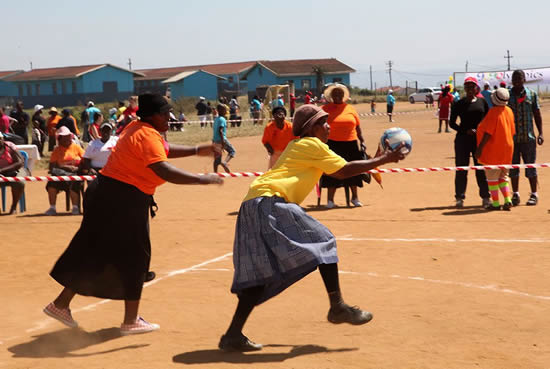 Every year more than a thousand elderly women take to the fields at Molweni sports centre west of Durban to battle it out in a special event: the Gogo Olympics.
Every year more than a thousand elderly women take to the fields at Molweni sports centre west of Durban to battle it out in a special event: the Gogo Olympics.
The Hillcrest Aids Centre and eThekwini Metro Municipality host the Gogo Olympics to promote a healthy lifestyle among senior residents.
Now in their seventh year, the games are a chance for gogos to compete in rugby, soccer, netball, volley ball, rope-skipping, high jump and more.
Most of the elderly women taking part are members of the Hillcrest Aids Centre’s Granny Support Group, says programme manager Cwengekile Myeni.
“The programme helps support grannies heavily burdened by the HIV pandemic,” Myeni says. “They have to take care of grandchildren who have lost their parents.”
Forgetting their worries
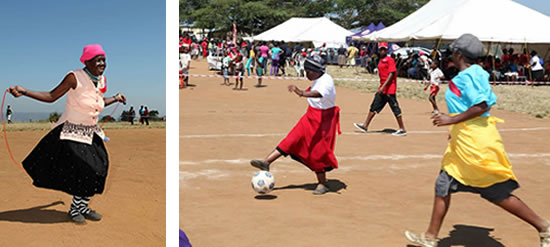 The programme empowers grannies raising HIV orphans. It provides training in sewing, beadwork and gardening so they can earn an income and provide for their families.
The programme empowers grannies raising HIV orphans. It provides training in sewing, beadwork and gardening so they can earn an income and provide for their families.
“It also encourages them to live a healthier lifestyle, as they do today,” Myeni says.
“We use sports as a means of forgetting their worries and de-stressing.
Gogo Olympian Zincengile Mhlongo, 68, says she trains hard every year to get ready for the games.
“This has helped me to live healthily and drink a lot of water,” she says.
“I do not have diseases − like high blood pressure and diabetes − that most people my age suffer from.
“I look forward to participating in the 2018 Gogo Olympics. Sport has become one of my daily activities.”
Important to the community
Simphiwe Mncube, Councillor for eThekwini Ward 9 – which hosted the games – says the elderly are important members of the community.
“We will continue to support such initiatives as they promote healthy lifestyle. With the scourge of HIV/Aids and poverty, senior residents continue to play a critical role in looking after orphaned children and homeless people.”
The Gogo Olympics also serve as a platform for selecting participants for the Golden Games – a national sporting competition for senior citizens and one of the Department of Sport and Recreation’s flagship events.
Gift Ngoepe a hit in US Major League Baseball
Gift Ngoepe a hit in US Major League Baseball lebangChicago Cubs pitcher Jon Lester has pitched a no-hitter and won three World Series. But earlier this year he gave up a hit to a one-of-a-kind player. Gift Ngoepe, a Polokwane-born infielder, was making his debut for the Pittsburgh Pirates as the first African-born player in the US Major Leagues.
 As Ngoepe was stepping up to the plate, his first thought went to his mother. Maureen Ngoepe died in 2013.
As Ngoepe was stepping up to the plate, his first thought went to his mother. Maureen Ngoepe died in 2013.
He wrote his thoughts on his blog, later: “This is it, Mom. We did it. We have made history!”
In the locker room after the game – that Pittsburgh won – Ngoepe told journalists, “Everything is breathtaking right now. This just shows it doesn’t matter where you come from. No matter where you are, who you are, you can still make it.”
Work makes dreams real
Mpho Gift Ngoepe was born in Limpopo. But from the age of two he lived with his mother in a room at the clubhouse of the Randburg Mets baseball team in Johannesburg. His mother ran the tuckshop, cooked for players and cleaned. It was here that he discovered his love of the American sport.
Years later, he was playing for the Randburg Mets. His teammates recognised his potential. They raised money to send him to a Major League academy in Italy in 2007, and helped him get sponsorship for tours to Cuba and Mexico.
He was spotted by the Pittsburgh Pirates, and signed to a Minor League contract. Over eight years he has become the team’s most talented defensive player.
It wasn’t always easy. At times he just wanted to give up and go home.
“My mom encouraged me to stay,” Ngoepe wrote on the Players Tribune blog. “It’s the people that are behind you that keeps you going every single day. That kind of kept my fight. My ninth year and I made it to the big leagues.”